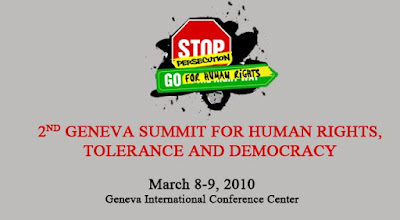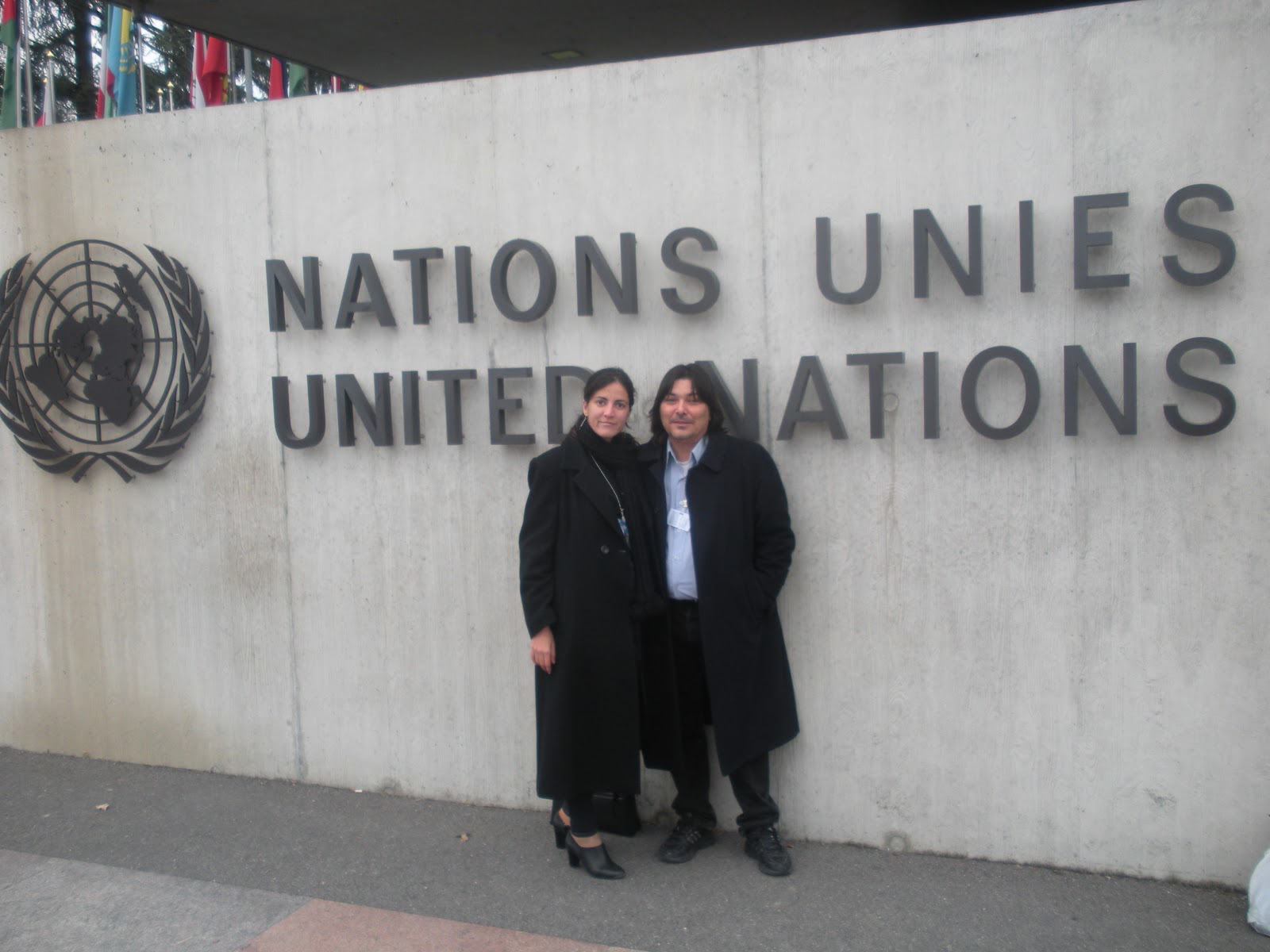"The world is in greater peril from those who tolerate or encourage
evil than from those who actually commit it." - Albert Einstein
The 14th Geneva Summit for Human Rights and Democracy convenes in Switzerland on April 6, 2022. Over the past fourteen years this summit has been and continues to be a vital space for dissenting voices to gather and engage in an important conversation: to diagnose the problems challenging human rights and dignity and to do better and be better in order to turn around the 16 year global decline in human rights.
The first edition was held on April 19, 2009, "one day before the international community gather[ed] in Geneva to address racism, intolerance and persecution in the High-Level Segment of the UN Durban Review Conference (DRC)" and it had a longer title, "Geneva Summit for Human Rights, Tolerance and Democracy" and the tag line, "Stop Discrimination, Go for Human Rights." UN Watch, a Geneva based NGO whose mission is "to monitor the performance of the United Nations by the yardstick of its own Charter", brought together an international coalition of nineteen organizations to co-sponsor the summit.
Founding members of the Coalition are: The Assistance Association for Political Prisoners (Burma), AVEGA (Rwanda), CADAL (Argentina), Directorio (Cuba), Darfur Peace and Development Center (Sudan), Fondation Généreuse Développement (Cameroon), Freedom House (USA), Freedom Now (USA ), Groupe des Anciens Etudiants Réscapés du Genocide (Rwanda), Global Zimbabwe Forum (Zimbabwe), Human Rights Without Frontiers (Belgium), International Federation of Liberal Youth, (United Kingdom), Ingenieurs du Monde (Switzerland) LICRA (France), SOS Racisme (France), Stop Child Executions (Canada), Becket Fund for Religious Liberty (USA), East and Horn of Africa Human Rights Defenders Project (Uganda), UN Watch (Switzerland). Fourteen years later the partners coalition has grown to 27.
Arielle Herzog, Leon Saltiel, Hillel C. Neuer and other UN Watch staff
were the chief organizers of the first six editions and responsible for
their great success and establishing this space for dialogue. UN Watch
today continues to lead this coalition and build on this great legacy,
but it is important to return to the beginning to see how we arrived
were we are today.
The UN Durban Review Conference (DRC) of 2009 was one more example of the ongoing moral bankruptcy of the United Nations. The star speaker, and apparently the only head of state invited to speak, was Iran's notorious president, Mahmoud Ahmadinejad who engages in holocaust denial
and has called for the destruction of Israel. This conference,
ostensibly to confront the problem of racism, began a gathering point of
the worse dictatorships on the planet to legitimize themselves and demonize Israel.
Meanwhile, in marked contrast, the Geneva Summit for Human Rights, Tolerance and Democracy was held at the Centre International de Conférences Genève, just down the street from the Palais des Nations UN compound where the DRC was being held. Human rights defenders, victims of repression and political dissidents gathered to share their experiences, bear witness, and attempt to wield real political force from the power of human conscience. This is what the martyred Czech dissident and philosopher Jan Patočka called the "solidarity of the shaken". This coalition called for an end to discrimination and for human rights promotion.
The first summit's inaugural speech was given by by Iranian Activist and President of Stop Child Executions, Nazanin Afshin Jam,
who outlined the human rights situation in Iran. She addressed that
under Iranian laws the life of a woman is worth half of a man's and
other sexist practices, the execution of homosexuals, and the executions
of minors. The Iranian activist also gave an overview of the summit
that began at 9:00am and ended at 6:30pm.
The inaugural summit was divided into four sessions that were tied into the Universal Declaration of Human Rights.
Session I was titled "Racism, Genocide, and Crimes Against Humanity: Assessing the Genocide Convention After 60 Years" and the panel was made up by Irwin Cotler, Counsel for genocide victims and dissidents, Canadian
MP, Gregory Stanton, President of Genocide Watch and International
Association of Genocide Scholars, Ester Murawajo, Tutsi survivor,
founder of AVEGA and Dominique Sopo, President of SOS Racisme.
Session II was titled "Resisting Authoritarianism: Human Rights, Democracy, and the Dissident Movement"
with speakers Bo Kyi, Burmese dissident and winner of the Human Rights
Prize from Human Rights Watch, Saad Eddin Ibrahim, Egyptian dissident,
José Gabriel Ramón Castillo, Cuban dissident and prisoner of conscience,
and Esra'a Al Shafei, dissident blogger, Mideast Youth - Thinking
Ahead.
Session III was titled "Torture and Cruel and Inhuman Treatment"
with speakers Nazanin Afshin-Jam, president of Stop Child Execution,
Parvez Sharma, Producer of the documentary Jihad for Love, and Ahmad
Batebi, Iranian dissident.
Session IV was titled "Freedom of Expression and 'Defamation of Religion'"
with panelists Mohamed Sifaoui, Journalist, Algeria, Floyd Abrams,
U.S. advocate for First Amendment press freedom, Patrick Gaubert,
President of LICRA and Member of the European Parliament.
The 2nd Geneva Summit was held on March 8-9, 2010, strategically timed
to coincide with the main annual session of the U.N. Human Rights
Council. The objective of the 2010 Geneva Summit was to give voice to
victims of
the world’s worst abusers, empowering those who suffer repression under
closed systems of government.
The program featured plenary sessions, workshops and training sessions
over two days. A large portion of the program was dedicated to
presentations—personal and compelling testimony—from victims of the
world’s worst abusers.
On March 8, 2010 gave the opening address
on behalf of the Geneva Summit Coalition for the second edition of the
Geneva Summit. Sadly, these words remain relevant today, but now the
global decline in political freedoms and civil liberties has expanded
from four to thirteen years in a row.
Regrettably, the chief international body charged with protecting human rights is failing to live up to its mission to stop these and other abuses. The Geneva-based UN Human Rights Council—as acknowledged in a recent report by 17 of its 47 member states, supported by Amnesty International, Human Rights Watch, and the International Commission of Jurists—falls short in its handling of country situations, in the efficiency of the process involved in highlighting violations, and in its reactivity to crisis situations. Strong politicization of the Council, driven by bloc-based voting patterns, has led to inaction in face of atrocity and abuse. We saw this sad spectacle last week within the Council, first with the secretary general of Iran’s High Council for Human Rights denying the documented and rampant instances of torture, executions, and mass detentions of Iranians followed by the Cuban Foreign Minister’s speech who echoing his Iranian colleague also denied Cuba’s horrible human rights record and to add insult to injury went on to blame the United States for the death of Orlando Zapata Tamayo as well as slander the deceased Cuban prisoner of conscience as a criminal.
Little wonder that the March 1st magazine issue of Newsweek contains an article titled “The Downfall of Human Rights.” The article highlights Freedom House's report "Freedom in the World," released in January, and reveals a global decline in political freedoms and civil liberties for the fourth year in a row, the longest drop in the almost 40 years that the survey has been produced.
According to Summit organizers, "[m]ore
then 800 people registered to attend the summit and over 1600 watched
the live webcast. 35 dissidents and human rights activists took the
floor to condemn and testify about some of the worst human rights
situations around the world and issued a joint call for Internet
Freedom around the world."
Cuban dissident Nestor Rodriguez Lobaina was denied an exit visa by the
Castro regime despite being invited to attend the Geneva Summit, but the
coalition did not stop there and started a campaign for him to attend.
30 NGOs from this Summit called on the UN High Commissioner for Human Rights to intervene on behalf of Cuban human rights defender Nestor Rodriguez Lobaina barred by the Cuban dictatorship from attending this meeting. The Cuban ambassador protested loudly when Hillel Neuer of UN Watch raised the matter in an interactive dialogue with the High Commissioner, but Nestor on the other hand was grateful that the UN Watch representative spoke up for his human rights.In the end Nestor addressed the summit by phone, and would attend and address the 2012 Summit in person. Still remember the powerful and haunting testimony of Caspian Makan, human rights activist, and fiancé of Neda Agha-Soltan, who was murdered in Iran by pro-regime agents months earlier on June 20, 2009. Another speaker who made a powerful impression was Yang Jianli, activist in the 1989 Tiananmen Square protest, a former political prisoner, and founder of Initiatives for China and today a friend. The Geneva Summit created network of activists that remain in contact and continue to collaborate.
Cuban human rights defenders and victims of repression have had a voice at this gathering over the past fourteen years to denounce their plight and call for human rights and freedom for Cuba. Former Cuban prisoners of conscience and human rights defenders Jose Gabriel Ramon Castillo (2009, 2010), Luis Enrique Ferrer Garcia (2011), Nestor Rodriguez Lobaina (2012), Regis Iglesias (2013), and Juan Francisco Sigler Amaya (2015), human rights defender and daughter of martyred actvist Rosa Maria Paya (2013, 2016), human rights defender Damarys Moya Portieles (2014), human rights defender and social democrat Manuel Cuesta Morua (2015), former prisoner of conscience, human rights defender and artist Danilo Maldonado El Sexto (2017), Sakharov laureate Guillermo Fariñas Hernández (2018), human rights lawyer Juan Carlos Gutiérrez representing Cuban prisoner of conscience Dr. Eduardo Cardet (2019), Cuban lawyer, journalist, and human rights defender who serves as Executive Director of the nonprofit Cubalex Laritza Diversent (2020), Cuban political performance artist Tania Bruguera (2021), and Cuban visual artist and political activist Hamlet Lavastida (2022).
2013 was the last time I addressed the Geneva Summit for Human Rights and Democracy during the fifth edition of the gathering and less than seven months after Oswaldo Payá Sardiñas and Harold Cepero Escalante had been murdered by State Security on July 22, 2012. Present in the room were Rosa María Payá Acevedo, and Regis Iglesias Ramírez of the Christian Liberation Movement. Both had addressed the meeting.
The 5th Annual Geneva Summit for Human Rights and Democracy today is an opportunity for reflection. Unfortunately, the human rights situation around the world has not improved over the past five years and in many instances worsened. The question is why? Cuban democratic opposition activist, Oswaldo Payá Sardiñas, when awarded the Sakharov prize for Freedom of Thought on December 17, 2002 observed that “The cause of human rights is a single cause, just as the people of the world are a single people. The talk today is of globalization, but we must state that unless there is global solidarity, not only human rights but also the right to remain human will be jeopardized.” The past decade has demonstrated that he was right.
Cuban state security has worked for decades trying to discredit and
silence authentic dissident voices and continues to today with their spies and agents of influence.
It is a constant struggle to frustrate their efforts. They are willing
to lie, slander, assault and even murder those who have the courage to
dissent. The 2012 killings of Oswaldo Payá and Harold Cepero and the firing on unarmed protesters during the 11J protests in Cuba demonstrate this.
For decades Cuban victims of repression said that nobody listened, and in 1987 an award winning documentary titled "Nobody Listened"
interviewed Cuban political prisoners and human rights defenders
describing the lack of international solidarity.
Over the past fourteen
years thanks to the Geneva Summit for Human Rights and Democracy their
voices have been and continue to be heard.
The next summit begins on Wednesday, April 6, 2022 at 9:00am Central European Time. For more
information visit the Geneva Summit website here. Use hashtags #GenevaSummit2022 and #GS22




















